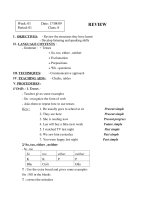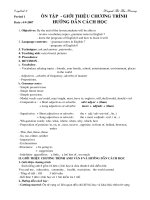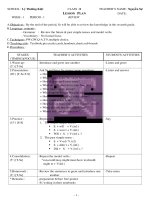1 ex session 8 unit 4,5,6 lexicology ex sts
Bạn đang xem bản rút gọn của tài liệu. Xem và tải ngay bản đầy đủ của tài liệu tại đây (94.98 KB, 8 trang )
Part 2. Lexicology Practices
Exercise 1. Which following statements are True or False.
1. Morphemes are the smallest divisible meaningful language units. FALSE
2. Lexicology studies various lexical units: morphemes, words, variable word-groups and
phraseological units. TRUE
3. Derived words are made of one free root and an affixational morpheme. FALSE -> pound
morpheme
4. Lexicology studies only some lexical units of morphemes, words. FALSE
Lexicology is concerned with the study of a wide range of lexical units, including morphemes and
words, and their various aspects. It's not limited to "only some" lexical units.
5. Compounds are divisible and it is possible to insert any other words. FALSE
The components of a compound contribute to its specific meaning. You
cannot typically insert just any other words into a compound without
changing the meaning or creating a new compound.
6. A compound can be spelt in three ways: with a hyphen between two components, with break
and without break. TRUE
7. A back-formation creates a new word by removing or adding an affix from an already existing
word, for example liaise from liaison. FALSE
Exercise 2. Rewrite each of the sentences below, forming a compound adjective from the two
words in italics and making any other changes necessary.
E.g. The journey took ten hours It was a ten-hour journey.
1. That thing looks dangerous.
2. She always dresses very smartly. She is a very smartly – dressed
3. She had eyes like a cat. She had a cat – liked eyes.
4. Only planes with a single engine can land here. Only single engine planes can land here
5. We walked along a corridor which had a red carpet. We walked along with a red carper
corridor
6. Mr. Reed is an accountant who was born in London. Mr. Reed is an London born accountant
7. It was painted red like the colour of bricks. It was bricks – red colour
8. The meal tasted awful. It was awful tasting meal
9. A building of five storeys suddenly collapsed. A five storeys biulding suddenly collapsed.
10. This machine is operated by hand. This is a hand – operated machine
Exercise 3. What are the methods of word-formation of the following words.
1. words from names 2. Affixation 3. Conversion 4. sound imitation
5. affixation 6. back formation 7. shortening - blending
8. compounding 9. shortening – acronym 10. Compounding
1
2
1. (to) 10.
google......word nightmare....co
s from names – mpounding
from
misspelling of
“googlo” =
number
2. non-smoker.
affixation
(frefix – non)
3. (a)
native..convers
ion (nound or
adj)
4.
cackle.........sou
nd imitation –
made by man
5.
forward.........a
ffixation
6. baby-
sit..........back
formation –
baby – sitter
7.
telecast......sho
rtening –
blending
8. paper-
thin......compo
unding
9. AIDS
.....short
ening acronym
3
Exercise 4. Comment on the word-formation and morphological structure of the underlined
words in the following sentences.
Example: Did he whisper to you about my weakness?
+ whisper: a simple word; formed by sound imitation.
+ weakness: a derived word with a root ‘weak’ and a noun suffix ‘ness’.
1/ They avoid talking with the servant who has got flu.
+ servant: ………a simple word, domestic worker………………………………………………………………
+ flu: ……shortening – acronym – influenza………………………………………………………………………..
2/ I was denied passage through my village.
+ passage: …a simple word……………………………………………………………………...
+ village: ………………………………………………………………………….
3/ Lifestyle is important in our life.
+ lifestyle: ………a compound word “life” and “style” ………………………………………………………………..
+ life: ………………a simple word ……………………………………………………………..
4/ She has sold some oranges and now she wants to hand the rest to me.
+ hand: ………………a simple word ……………………………………………………………
+ rest: …………………a simple word …………………………………………………………..
5/ He managed to roar the brand new dream and disappeared.
+ roar: …………………a simple word …………………………………………………………
+ dream: ………………a simple word …………………………………………………………
Exercise 5. Fill each space with one word from the list so as to complete the following sentences.
Use the words once only and do not change their given form.
Roman average round even odd dozen
digits good gross cardinal scores ordinal
1. It was after midnight but there were still ………scores…..…….of people in the streets.
2. 1,2,3,4,5 etc. are …cardinal……….. numbers. 1st, 2nd, 3rd, 4th,5th etc. are …ordinal………… numbers.
3. OK, I’ll lend you the $95 you need. Well, let’s make it a …round…….number. Here is $ 100.
4. Each packet contains a ……dozen…………of paper-clips.
5. 2,4,6,8,10 etc. are ……even…….numbers. 1,3,5,7,9 etc. are ……odd…...…..numbers.
6. There are normally seven …digits……….. in a London telephone number.
7. I, II, III, IV etc. are known as ……Roman………..numerals.
8. It was a bargain. I paid £10 but it was worth a ….gross……..fifteen.
4
Exercise 6. Use the word given in capitals at the end of each line to form a word that fits in the
space in the same line. There is an example at the beginning (0).
The environment: Our responsibility
These days it is (0) ..impossible.... to open a newspaper without reading possible
about the damage we are doing to the environment. threat
The earth is being (1) ............ and the future looks bad. What can each of us
do? pollution
We cannot clean up our (2) .............. rivers and seas overnight. Nor can we
stop the (3) ............. of plants and animals. But we can stop adding to the appear
problem while (4) ............ search for answers, and laws are passed in science
nature’s (5) ................ defend
It may not be easy to change your lifestyle (6) .............. , but some steps are complete
easy to take: cut down the amount of (7) ............ you do, or use as little drive
plastic as possible. It is also easy to save energy, which also reduces
(8) .............. bills. We must all make a personal (9) ................ to work for house
the future of our planet if we want to (10) .............. a better world for our decide
grandchildren. sure
Exercise 7. Fill each space in the sentences below with the suitable word derived from the word
in bold print above it.
Example: decide
A/ We must come to a decision very soon.
B/ We beat them decisively. We won 7: 0
C/ He can never make up his mind. He’s very indecisive
1. beauty
a/ She is very ......................................
b/ She’s training to be ......................................
c/ They’re going to ...................................... the town with more trees and parks.
2. pay
a/ To buy this car I made a monthly ....................................... of £ 280 for two years.
b/ Please make your cheque .......................................to John Watson.
c/ The person a cheque is made out to is called the ......................................
3. receive
a/ She works as a .............................. at a hotel in Scotland.
b/ Ask for a .............................when you buy something. In case you need to return it.
c/ I made several suggestions to improve production, but the management was not
very ............................. to my ideas.
5
4. hero
a/ He received a medal for his ..............................
b/ They fought .............................. in the war.
c/ She was described as a ..............................
5. produce
a/ ..............................of the new sports car has been halted by a strike.
b/ China is one of the world’s leading ..............................of rice.
c/ I’m afraid the talks were totally............................... We didn’t reach agreement on anything
6. explain
a/ An ..............................leaflet is given to all purchasers of the machine.
b/ His disappearance is very strange, in fact quite ..............................
c/ I think you owe me an ................................for your behaviour.
7. compare
a/ This is ......................... better than that. In fact, there is really no .............................
b/ Scientists have made ................................tests on the new drugs.
8. advise
a/ Until the situation has settled down, it is .............................. to travel to that country.
b/ The government set up an .............................. body on the use of drugs in sport.
c/ I doubt the.. ......................of drinking alcohol while undergoing that medical treatment.
9. admire
a/ She was a pleasant, attractive girl, always surrounded by ..............................
b/ I am full of ..............................for what she has achieved.
c/ I approve of him wholeheartedly. He is an ...............................man.
10. stable
a/ To ..............................the boat in rough sea, we redistributed the weight.
b/ Between 1860 and 1900 the country had a number of revolutions and uprisings. It was a time
of great ...............................
c/ The exchange rate is going up and down dramatically. It’s very ............................... at the
moment.
11. real
(a) I think it’s a bit …..........….to hope that world peace can be gained so easily.
(b) He spends all his time in romantic daydreams. He’s lost touch with…......…..
12. omit
(a) She was accused of…......................….the financial accounts.
(b) It is an ……….........…..if you didn’t do it.
13. describe
6
(a) The damage caused by the earthquake can not be imagined. It was….........….
(b) The teacher asked them to write a…..........….......passage about their homes .
14. friend
(a) The……............................between the two soon developed into love.
(b) In London she was…..................……by a rich woman who looked after her and helped her.
15. sense
(a) He felt a strange, painful……................….in his back.
(b)Even the most……......…...person ought to appreciate the beauty of this music.
16. famous
(a) The………............of the Beatles soon spread outside Britain.
(b) The day of the massacre will go down in history as a terrible……............day.
17. defend
(a) I just want to ask you a few ordinary questions, so why don’t you relax? Why are you
so……...............….?
(b) The government's policy on arms is shocking. It is quite……............... .
18. agree
(a) What an unpleasant, …….................…old woman she is!
(b) We finally reached an……...............….on the matter at midnight.
19. possess
(a) In his will he left all his money and……............…..to his wife.
(b) She was a very………............mother. She gave her son very little freedom.
20. different
(a) I’m afraid I have to…..............…….. I don’t agree with you at all.
(b) Politeness is one thing. Real kindness is another. You must learn to…....................….between
the two.
Exercise 8. Fill each of the numbered blanks in the following passage. Use only one word in each
space.
Tom Sponson, .....................(1) fifty three, was a thoroughly successful man. He .....................(2)
worked up a first-class business, had a charming wife, and built himself a good house in the
London suburbs that was neither so modern as to be pretentious .....................(3) so conventional
as to be dull. He had good taste. He soon was doing well at Oxford. His daughter who
was .....................(4) a good school had no wish to apply make-up, to wear low
frocks, .....................(5) to flirt. She still saw herself as too young .....................(6) these trifling
amusements. Yet she was gay, affectionate, and thoroughly .....................(7) with life. All the same,
for .....................(8) time, Tom had been aware that he was working very hard .....................(9) very
7
little. His wife gave him a little kiss in the morning when he .....................(10) for the office and, if
she were not at a party, another little kiss in the evening when he came home.
Exercise 9. In most lines of the following text, there is one word which is not in the correct form.
Write the correctly formed word in the space provided. Some lines are correct. Indicate these
lines with a tick (√).The exercise begins with three examples(0).
The English plant collectors
0 collecting Who were the people responsible for collection and sending plants from one
0√ country to another? And why did they do it? Initially they were travelers with
0 purposes other purpose: traders, colonists, pilgrims and missionaries have all been
1 …............ important in providing new plants for English gardens. They sent back
2 …............ indigenous wild plants, or sometimes, as in the cases of visitors to China and
3 …............ Japan, plants which have been cultivated and improved for hundreds of years.
4 …............ This worked, of course, in both directions: English gardens were making in the
5 …............ most unlikely places.
6 …............ Travelers did not always realise an interesting plant on seen it- interesting,
7 …............ that is, to the collector at home. So in the 16th and 17th century, attempts were
8 …............ made to collect on a most professional basis, either by patrons sending
9 …............ collections into the field, or by subscriptions to finance local enthusiasts in the
10 …............ most promised areas. By 1611 John Tradescant was traveling and collecting
in France and other parts of Europe.
8









